8 Best Big Cartel Alternatives For 2024 (Pros And Cons)

Looking for the best Big Cartel alternatives on the market? You’re in the right place.
Big Cartel is a great, affordable platform for artists and makers that are just getting started with ecommerce. But as your business scales up, you could easily outgrow it.
But fear not, because there are tons of awesome alternatives to Big Cartel out there to choose from. And in this post, we’ll be reviewing and comparing each of them to help you figure out which one is the best fit for your needs.
The best Big Cartel alternatives – summary
TL;DR:
If you’re looking for the easiest way to build an online store, Sellfy is your best bet.
You can use it to sell physical products, digital products, print-on-demand merchandise, subscriptions, and even video content. Most importantly, it’s extremely easy to use.
For those looking to start an ecommerce store with a large number of products, Shopify is a solid option.
And if you’re in need of a website builder that comes with ecommerce functionality, Squarespace is worth checking out.
#1 – Sellfy
Sellfy is our top pick for the overall best Big Cartel alternatives. It caters to a similar target market—Sellfy is built for creators, Big Cartel for artists and makers—and is just as easy to use. But it offers a lot of additional features and benefits that you don’t get with Big Cartel.
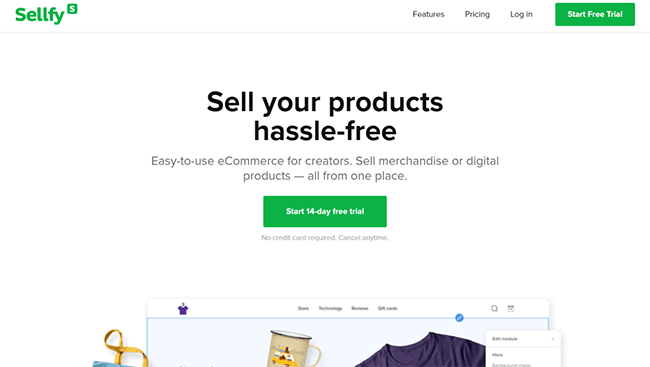
First off, unlike Big Cartel, Sellfy lets you add unlimited products no matter what plan you sign up for. This is important for sellers who have a large product catalog.
And even if you don’t have a lot of products to sell right now, you don’t want the growth of your business to be capped by your ecommerce platform. With Sellfy, there’s room to expand in the future as your business grows.
Secondly, Sellfy also supports a much wider variety of product types than Big Cartel. With Sellfy, you can sell physical products, but also digital downloads, subscriptions, video content, and even print-on-demand (POD) merchandise.
To sell print-on-demand merch with Big Cartel, you’d need to integrate it with a third-party POD fulfillment provider like Printful or Art of Where. But with Sellfy, you get print-on-demand right out of the box.
All you have to do is sign up, choose the products you want to sell out of Sellfy’s POD catalog, and upload your designs to them.
Then when a customer places an order, Sellfy will print and ship it from their global fulfillment centers for you. They charge you the base cost of the item, and you keep the markup as profit. Cool, huh?
The process of building your store on Sellfy is super easy too. You can get everything set up and start selling online in under an hour. And you can use the built-in marketing and sales tools to attract and convert more customers.
Key features
- Sell digital and physical products
- Print-on-demand fulfillment
- Video streaming
- Subscription
- Store customization
- Shopping cart
- Custom domain
- Localization
- Discount codes
- Email marketing
- Upsells
- Embeds
- Security features
Pros
- Very easy to use
- Intuitive user interface
- Supports a large variety of product types
- Unlimited products on all plans
- Native print-on-demand fulfillment
Cons
- Limited payment gateways to choose from (PayPal and Stripe only)
- Limited sales per year ($10k to $200k depending on your plan)
Pricing
Plans start at $29/month and you can get started with a 14-day free trial. Yearly and 2-yearly discounts available.
Read our Sellfy review.
#2 – Shopify
Shopify is the best Big Cartel alternative for serious ecommerce businesses. It comes with one of the most robust feature sets we’ve seen and is incredibly powerful.
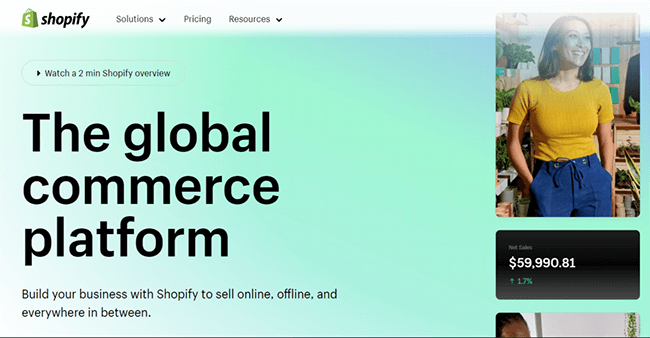
The reason Shopify is the best choice for serious ecommerce site owners is that it offers unparalleled flexibility and scalability.
With Shopify, you get unlimited products and bandwidth, so you won’t outgrow it no matter how much traffic your site gets or how many products you sell.
You also get a ton of powerful features to help you manage your store and drive sales out of the box.
That includes robust order and inventory management tools, a flexible drag-and-drop store builder, a shipping and fulfillment network, a chatbot (Shopify Inbox), customer analytics, email marketing, social media integrations, automation tools, and much more.
And if that’s not enough, there are also over 6,000 third-party add-ons in the Shopify App Store. You can install them into your Shopify store in a couple of clicks to instantly extend its functionality. In comparison, Big Cartel only lists a few dozen add-ons on its apps and integrations page. This extensibility is another one of the things that makes Shopify so flexible.
Shopify also wins when it comes to SEO. It uses SEO best practices and offers clean URLs, robot.txt file access, alt text, simple navigation, and a bunch of other stuff that can improve your chance of ranking in the search results.
In terms of design, Shopify uses a clean, simple user interface that’s easy to work with. And it gives you access to around 100 store themes to choose from (mostly paid themes, but also a few great free options). In contrast, Big Cartel only offers 18 themes.
All that said, one thing Big Cartel does have over Shopify is no transaction fees.
Unfortunately, Shopify takes a small cut of merchant sales (0.5% – 2%) if you choose to use a third-party payment gateway (i.e. anything other than Shopify payments). This sneaky little added cost is actually how Shopify makes the bulk of its income.
You can get around it by using Shopify’s payment processor, but if you want to use PayPal or Stripe, it’s not ideal.
Key features
- Website builder
- Shipping tools
- Inventory management
- Order management
- Shopify Inbox
- App store
- Shopify POS
- Store themes
Pros
- Powerful and flexible
- Unlimited products and bandwidth
- Huge app store (6,000+ available integrations)
- Clean user interface
Cons
- Higher starting price than Big Cartel
- Transaction fees apply if you use a third-party payment gateway
Pricing
Shopify plans start from $5/month (+ transaction fees), save 25% with annual billing. Get started with a 3-day free trial, then $1/month after for 3 months.
Read our Shopify review.
#3 – Payhip
Payhip is a great Big Cartel alternative for selling digital products, but you can also use it to sell physical products.
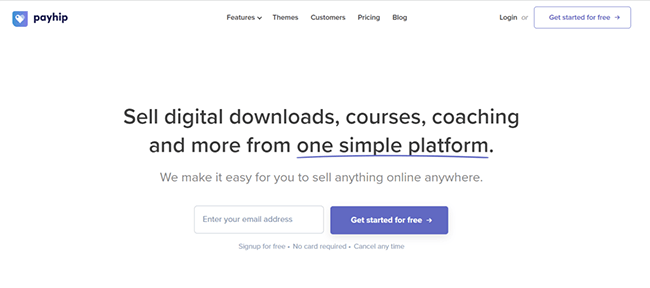
One of the biggest problems with Big Cartel is that it doesn’t offer the ability to sell digital products natively. You have to sign up for Pulley (a paid third-party tool) separately and connect it to your store first.
In contrast, Payhip makes it super easy to sell all sorts of digital products. It supports digital downloads, online courses, coaching products, memberships, and more—no third-party integrations required.
And because it’s designed for users selling digital products, it comes with a bunch of useful features to help you create those products and deliver them to your customers.
For example, it lets you set up your checkout so that customers are given instant download access to the files they buy on your site and emails them a link to the download immediately after purchase.
To protect your digital content, you can limit downloads and utilize Payhip’s PDF stamping feature, which helps to discourage illegal sharing. Plus, use Payhip to issue software license keys.
The built-in online course feature allows you to build online courses, and deliver your courses to students via a branded course player.
You can add multimedia content like videos, quizzes, text, assignments, and more to your course lessons, and students can access it all from their own account page. Plus, you can even set up drip content delivery to control when students can access individual lessons and modules.
Aside from that, we also like how easy Payhip is to use. The store builder is great and the checkout process is seamless.
Payhip can even automatically detect where your customers are based and apply the correct amount of VAT and tax rates to their transactions, which makes it easier for new sellers to ensure they’re tax compliant.
All plans include unlimited products and revenue, and all features, but only the Pro plan offers zero transaction fees.
Key features
- Store builder
- Payments
- Marketing tools
- Email marketing
- Automatic VAT & taxes
- Digital downloads
- File delivery
- Memberships/subscriptions
- Online courses
Pros
- Ideal for selling digital downloads
- Good security features
- Generous free plan
- Unlimited products and sales
- Easy to use
Cons
- Transaction fees on the Free and Plus plan
- Support could be better
Pricing
Payhip offers a free forever that’s subject to 5% transaction fees.
The Plus plan costs $29/month with 2% transaction fees. And the Pro plan costs $99/month with zero transaction fees.
Read our Payhip review.
#4 – Squarespace
Squarespace is one of the most well-known website builders on the market thanks to its heavy television and influencer marketing campaigns. It’s well-known as being an easy-to-use solution and you can build a store in just a few clicks.
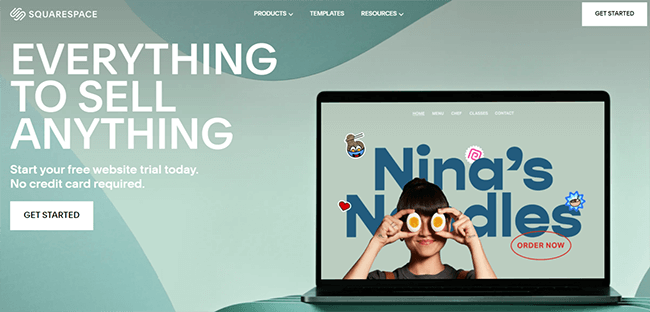
There are tons of responsive store templates to choose from and you can easily customize them thanks to Squarespace drag-and-drop store editor.
Although Squarespace is best known for its site-building functionality, it also has a good range of ecommerce features that can help your business grow. You can use Squarespace to manage all of your store tasks from one easy-to-use dashboard, including shipping, taxes, fulfillment, and more.
Squarespace also seamlessly connects with all your favorite e-commerces tools and payment gateways, including PayPal and Stripe, Printful for POD products, FedEx, and much more. There’s also a good selection of SEO tools and other marketing options.
Another perk of Squarespace is that you can connect all of your social accounts and set up automations to push website content to your social audiences.
Squarespace is also a good option if you are looking to sell services rather than products. You can easily create intuitive sites that will allow you to take bookings, manage a calendar, etc.
Overall, Squarespace is a very beginner-friendly option that will allow you to create a sleek and professional online store in just a few clicks.
Key features
- Intuitive store builder
- Good selection of responsive store templates
- Long list of integrations
- Supports service-selling sites
- Social media features
- Lots of payments gateway options
- Analytics
- Automation options
- SEO tools
- Email marketing tools
Pros
- Very easy-to-use
- Professional and responsive site templates
- Good selection of ecommerce tools
Cons
- Some plans include transaction fees
- Commerce plan (with 0% transaction fees) is quite expensive
Pricing
Plans start from $23/month. However, if you want a plan with 0% transaction fees, you’ll need to opt for the commerce plan which starts at $36/month. Save 30% with annual billing. 14-day free trial is available.
#5 – Volusion
Volusion is a lesser-known but useful alternative to Big Cartel that would be a good choice for entrepreneurs and businesses that are looking to sell only digital products.
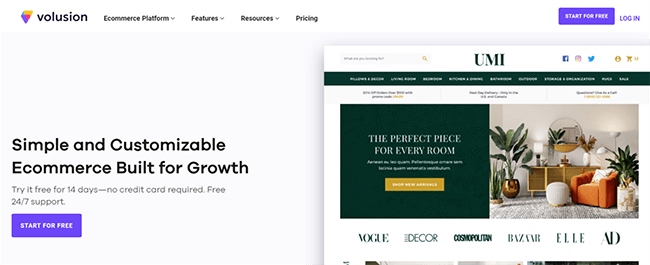
Whilst it’s a solid option, you can’t sell digital products using Volusion, so this is definitely worth considering if you’re thinking of expanding your product offerings in the future.
However, what it lacks in the digital product department it makes up for in its ease-of-use and business management features. Volusion couldn’t be compared to more expansive ecommerce platforms like Shopify or BigCommerce, but in terms of basic functionality, it has a lot to offer.
Firstly, Volusion’s store builder is intuitive and easy to navigate. There are a bunch of responsive and professional themes for you to choose from, and these can be easily customized to fit your business branding.
It has some great product display options, and you can easily categorize your products, manage on-page SEO elements, and more. You can also access the HTML and CSS to customize your store further if you wish.
Volusion also offers a range of features that can help your business to grow including SEO management features, a CRM system, social management, and a newsletter feature.
By upgrading to a Prime plan, you’ll also get support from a dedicated client success manager, which is a huge bonus if you’re new to managing an online store.
Volusion also has a good selection of payment gateway options and offers in-depth analytics, which is a big perk.
The only real drawback with Volusion is the price. Although it has some useful features and good support options, it’s quite pricey, with personal plans starting from $35/month.
Key features
- Intuitive store builder
- In-depth analytics
- Good selection of store themes
- HTML & CSS editor
- Dedicated support available
- SEO management features
- Newsletter feature
- Social management
- CRM system
Pros
- Easy-to-use
- Good selection of responsive themes
- Good analytics data available
Cons
- Expensive in comparison to other similar options
- Cheaper plans don’t have access to some key features
- No free plan available
Pricing
Plans start from $35/month. There is also a 14-day free trial available. Save 10% with annual billing.
#6 – Weebly
Weebly is another affordable, and full-featured alternative to Big Cartel. It’s also fairly easy to use making it a good choice if you’re new to the ecommerce world.
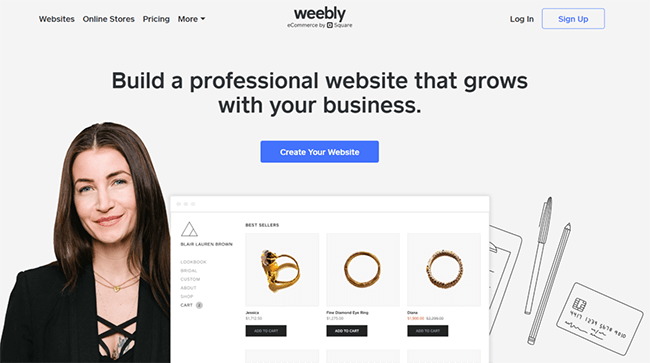
You can build your store by selecting one of the neatly organized and optimized themes. There are tons of options for online stores as well as templates for business pages, blogs, portfolios, etc.
You can then choose to sell digital goods, services, physical products, and more.
There are also some features to help you boost conversions and make a seamless checkout process for your customers, from notifications about how many products you have left to Square integration and cart management options.
You can also access marketing features like the voucher builder that you can use to create buying incentives for customers.
Weebly also has an easy-to-use analytics dashboard that you can use to view and optimize conversions and sales, track performance and improve rankings.
Overall, Weebly has everything you need to quickly launch an ecommerce store, and it’s not too over-facing when it comes to features.
Weebly has a free plan on offer, which is great for when you’re just getting started, but if you want to connect a custom domain, or have more flexibility and feature options, then it’s best to go with one of the paid plans.
Key features
- Good selection of store themes
- Easy-to-use store builder
- Analytics dashboard
- Marketing tools
- Voucher builder
- Square integration
- SEO tools
- Custom domains available
Pros
- Easy-to-use
- Simple, but with all necessary features included
- Good selection of store themes
Cons
- Have to use a paid plan to connect a custom domain
- Not as full-featured as some other options
Pricing
Weebly offers a limited free plan. Plans that include the option to connect a custom domain start from $13/month. Annual discounts available.
#7 – Shift4Shop
Shift4Shop, previously known as 3dcart, is one of the most affordable alternatives to Big Cartel. It also has a great feature set, making it well worth considering if you’re an ecommerce startup that’s pinching the pennies.
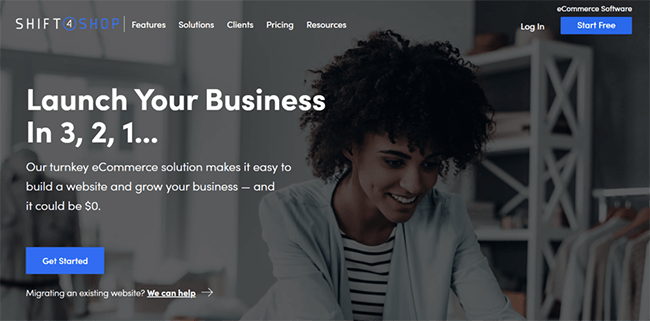
Shift4Shop also claims to offer more features than any other ecommerce platform on the market, and it seems quite easy to use. To get started, you can build your own shop by making use of one of the 100+ free optimized themes on offer.
Shift4Shop also adds new themes every month giving your flexibility to improve and scale your site in the future. When building your website, you aren’t limited to a certain type of commerce model.
You can build everything from a dropshipping site to a digital download marketplace, or even a subscription-based site.
After choosing your theme, you can use the intuitive Core Theme Editor to customize your layout, choose a new color scheme, and more. You can also make edits to the HTML and CSS if you wish, giving your full reign over your site’s aesthetic and functionality.
You can add as many products to your site as you like, and keep things streamlined using product categories that improve SEO. Shift4Shop also offers PCI-certified reliable hosting, as well as marketing and SEO features and more—for free.
So, how can they offer all of this and more for no cost? Well, this is where things get a little complicated.
In order to make use of the end-to-end free plan, you are required to use Shift4, Shift4Shop’s custom payment processing gateway, and process over $500 in payments every month.
For established ecommerce businesses, this should be a cinch, but if you don’t process that amount of sales or you want to use a more well-known payment gateway like PayPal then you will be required to pay a subscription fee of $29/month.
Key features
- 100+ store themes
- Intuitive store builder
- Product categories
- Order management and processing
- Product management
- Shift4 processing gateway
- Abandoned cart recovery
- SEO tool suite
- Blogging and social media tools
- Ad management
- Landing page builder
- Secure hosting
Pros
- Free end-to-end plan
- Wide range of SEO and marketing features
- Big selection of optimized themes
- Easy-to-use page builder
Cons
- Chargeable if you want to use a different payment gateway like PayPal
- Only free if you process $500+/month in payments using Shift4
Pricing
Shift4Shop’s end-to-end commerce plan is free if you use the Shift4 gateways to process more than $500/month in sales. If you don’t meet this requirement, the monthly subscription plan costs $29/month.
#8 – BigCommerce
BigCommerce is an all-inclusive ecommerce platform that offers a great alternative to Big Cartel.
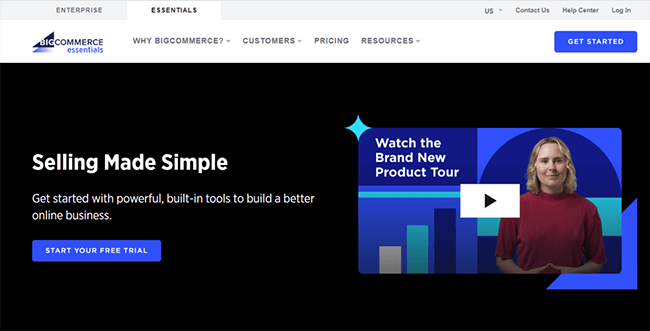
Unlike Big Cartel, which is better suited to smaller artistic ventures, BigCommerce is a fully-fledged ecommerce solution that can be used to grow and scale your business.
They offer a selection of Essentials Plans for growing businesses, as well as enterprise plans, so the sky really is the limit when using this software.
BigCommerce is a true all-in-one solution with over 100 tools built in and even more options for apps and integrations.
With BigCommerce, you can manage every step of your ecommerce journey. You can start by building a highly optimized store using one of the many templates available as well as an intuitive drag-and-drop page builder.
Then you can launch it on a custom domain. After that, you can make use of a ton of marketing and sales features that ensure your conversion rates skyrocket.
You can use the customer group features to pinpoint and target certain types of customers and show them personalized offers and messages.
You can also streamline the checkout process using the range of checkout tools on offer, as well as dedicated SSL support to allow shoppers to remain on your domain whilst checking out.
There’s also an abandoned cart feature available for Plus plan users and above.
BigCommerce also offers tons of features for marketing, SEO, and more to ensure that you can grow your business on all fronts.
Compared to Big Cartel, BigCommerce’s feature set really does seem endless, but with a tool like this, the learning curve required to get to grips with all the features can be steep.
However, it’s a solid solution for anyone looking for an all-in-one solution that can help them take their business to the next level.
Key features
- Drag-and-drop store builder
- Store templates
- Streamlined checkout solutions
- SSL support
- Abandoned cart recovery
- SEO and marketing tools
- Email marketing
- Inventory management
- Personalization and segmentation
- Social media and ad features
Pros
- Wide range of templates to choose from
- Good selection of apps and payment gateways
- Powerful analytics and marketing features
Cons
- Not the most beginner-friendly tool available
- Full-featured plans are expensive
Pricing
Plans start from $39/month, save 25% with annual billing. There is also a 15-day free trial available.
Big Cartel alternatives FAQ
What is better than Big Cartel?
All of the other ecommerce platforms on this list could be a better solution than Big Cartel for certain sellers. But ultimately, it depends on your personal preferences and the features that matter most to you.
Which is better, Big Cartel or Shopify?
In our opinion, Shopify is the better platform of the two.
It’s the most popular ecommerce platform in the world and has a better checkout, a great UI, a better selection of design templates and store management features, and is more scalable and flexible thanks to the Shopify App Store. Plus, it lets you add unlimited products on every plan.
That said, Shopify is also more expensive than Big Cartel, so Big Cartel can still be a good option if you’re a cash-strapped startup, you only plan on selling a small number of products, and you don’t need all the bells and whistles that Shopify offers.
Does Big Cartel take a percentage of sales?
No, Big Cartel doesn’t charge any transaction fees or take a cut of your online sales. It only charges a monthly subscription fee. This is one of the best things about the platform.
Just keep in mind that the payment processor you use to take payments through your Big Cartel store may charge separate transaction fees.
Is Big Cartel good for beginners?
Yes, Big Cartel is a beginner-friendly platform that’s built for artists and makers. You should be able to use it without any technical knowledge, but you might find you outgrow it quickly. Some of the other platforms in this list are equally beginner-friendly but more flexible and scalable.
Related Reading: The Best Ecommerce Platforms For Beginners (Comparison).
Is Big Cartel better than Etsy?
Both Big Cartel and Etsy are good places for artists and makers to sell their products. Each has its strengths and weaknesses.
Big Cartel is better in that it gives you more control and doesn’t take a cut of your online sales like Etsy. However, Etsy has the advantage of already being a popular marketplace, which makes it easier for customers to discover your products.
So if you don’t want to have to do a ton of marketing to make sales, and you don’t mind giving up some control and paying transaction fees on your sales, Etsy may be a better solution.
What payment processors does Big Cartel support?
Big Cartel supports Stripe, PayPal, Apple Pay, PayPal Credit, and Stripe Terminal for iOS and Android.
Final thoughts
That concludes our roundup of the best Big Cartel alternatives on the market.
The only question that remains is: Which one should you use to power your ecommerce store?
To figure that out, you’ll have to weigh up the options. The best choice for you will depend on what kind of products you’re selling, the features you need, the size of your online business, and your budget.
That said, you can’t go wrong with any of our three top picks. Here’s a quick reminder of what they are and who they’re best for:
- Sellfy is the best choice if you want to get started quickly. It’s super easy to use, has no transaction fees, and lets you sell all kinds of products (physical products, digital downloads, POD merch, etc.).
- Shopify is the best choice for sellers that plan on selling a larger number of products and have outgrown Big Cartel. It’s fast, powerful, and infinitely extensible.
- Squarespace is a solid choice for users that want to keep things simple. It’s a general-purpose website builder that comes with solid eCommerce functionality.
If you still haven’t found what you’re looking for, you can explore more Big Cartel alternatives in our roundup of the best ecommerce platforms.
Also, if you’re ready to scale up your store and expand your product catalog, make sure you check out this list of the best products to sell online.
Disclosure: Our content is reader-supported. If you click on certain links we may make a commission.
